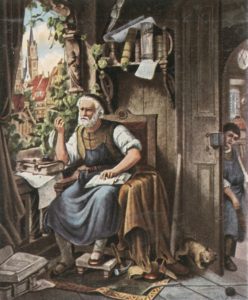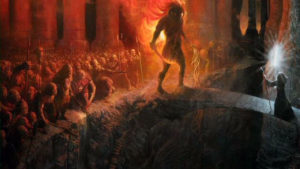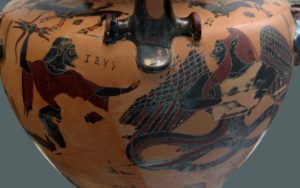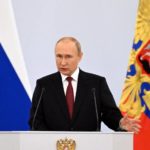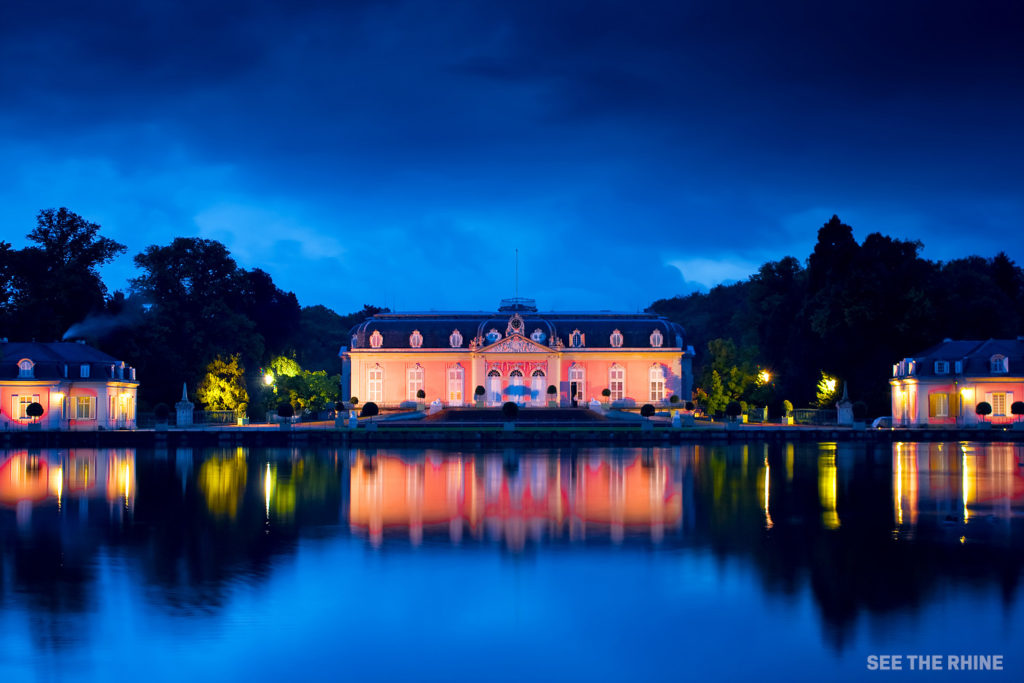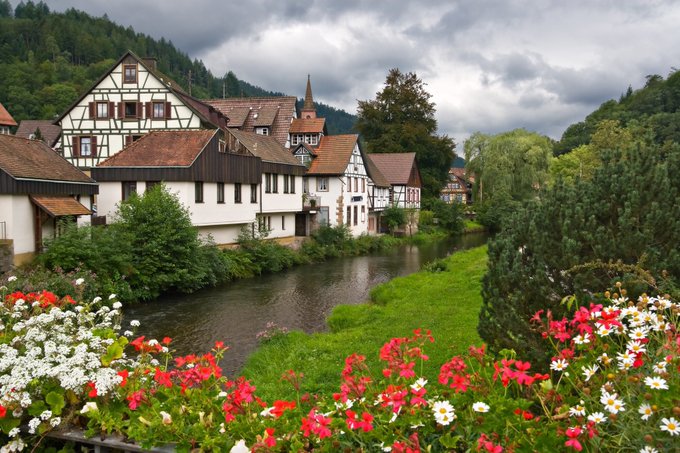The butcher of the Saxons
While Charles was making his conquests in northern Spain and losing them again—the only defeat suffered by a Frankish army under his command—Widukind, a Westphalian nobleman who had returned from Danish emigration (and who is first named in 777, when he failed to attend the Diet of Paderborn), advanced with his Saxons south to Fulda and west to Koblenz and Deutz. Feudal castles and churches were destroyed and villages burned and annihilated in a rampage that was not so much for booty as for revenge.
In 779 Charles advanced to the Weser, and in 780 to the Elbe. Again not only the East Saxons but even the Wenden on the other side of the Elbe and ‘people from the north’ were baptised. Again there were pledges of allegiance and new hostages were taken. At a national assembly in Lippspringe, the sovereign tried ‘explicitly to promote [the spread of Christianity in Saxony] and thus accelerate the development of feudal relations’ (Epperlein). Christian priests spread the new ‘enlightenment’ among the occupied burghs. ‘They carried crosses and sang pious songs; soldiers heavily armed with all kinds of weapons were their escorts, who by their determined gestures accelerated Christianisation’ (De Bayac).
The plundered territory continued to be distributed to bishops and abbots, missionary dioceses were created, churches were built and even minor monasteries, such as those of Hersfeit, Amorbach, Neustadt on the Main, were incorporated by Charles into the conversion of the pagans. And above all, of course, Fulda, whose abbot Sturmi held ecclesiastical and military command over the Saxon fortress of Erasburg until shortly before his death. In the northwest, the propaganda was carried out by Bishop Alberic of Utrecht, who had destroyed the remnants of paganism in West Frisia. On his orders and backed by Charles’ military power, Alberic’s monks smashed the statues of the gods and plundered the pagan shrines and everything of value they could find. The monarch gave part of the treasures of the temples to the bishop for ecclesiastical purposes. The Anglo-Saxon St Wilehad, who had already indoctrinated the Frisians, albeit without much success, organised the northern part of subjugated Saxony on Charles’ behalf from 780 onwards. Similarly, St Liudger worked in Central Frisia at Charles’ request.
But when the East Frisians, and also large sections of the population of Central Frisia, rose in revolt against the Saxons, destroyed the churches and turned to their former beliefs, the Christian preachers left the country in haste. The Englishman Wilehad, who shortly afterwards was consecrated bishop for the Saxon mission and first prelate of Bremen, fled to Rome and then devoted himself—according to Echternach—‘for two years to study and prayer’ (Lexikon für Theologie und Kirche). St Ludger, later Bishop of Münster, took refuge in Rome and Monte Cassino. Without the protection of the Frankish arms, the heralds of the good news couldn’t survive. But as soon as the occupiers regained control of the countryside, the ecclesiastical lords also returned with their swords to the propaganda front. Wilehad took up his seat in Bremen and St Liudger established himself, on Charles’ orders, east of the Lauwers. There, with the backing of royal power, he destroyed the pagan shrines (fana), advanced to the islands and, with the support of Frankish soldiers, devastated the sacrificial places of the Frisian god Phoete in Heligoland.
For the rest, many churchmen must have returned only reluctantly among the rebellious Saxons. And when the Saxons, along with the Vendeans, rose again under Widukind, their fury was focused on the clergy and Christianity, with many of the churches being set on fire, while the priests fled. A Frankish army was wiped out at Süntel, ‘almost to the last man being slain by the sword’ according to the Annals, which adds: ‘The Frankish loss was even greater than the figures might indicate’. Two dozen nobles also perished in the slaughter. But before Charles arrived, the Saxon nobility and some Frankish troops had already crushed the rebellion. The Saxon ‘nobles’ surrendered the rebels. And then Charles intensified the expansionist and missionary war until the famous beheading of Verden on the Aller and then, as usual, celebrated Christmas and Easter, the birth and resurrection of the Lord.
Even in the 20th century, ‘professionals’ in the Catholic and Protestant camps have sometimes tried to deny the orgy of cruelty and barbarism. Episcopalian devotionalists and some ‘specialised theologians’ worked shoulder to shoulder on this subject, especially during the Nazi period.
In 1935, the ecclesiastical spokesman of the Osnabrück bishopric spoke of ‘the fable of the Verden blood trial’. Similarly, the Protestant professor of Church History at the University of Munich, Kari Bauer, claimed in 1936 that the verb decollare (to cut the throat), which appears in the sources, was a misspelling instead of the original delocare or desolare (to banish); consequently, 4,500 Saxons were only expelled from the place. It must be said, however, firstly, that this verb or a similar one isn’t used in the various sources; and secondly, that four yearbooks of the time speak of the ‘slaughter’ (decollare / decollatio) of the Saxons. Such are the royal Annals, the Annales Amandi, the Annales Fuldenses and finally, in the first half of the 9th century, also the Annales Sithienses. And the chroniclers all from the most diverse places would have committed in a highly mysterious way the same ‘errata’.
And it would be a very different ‘misprint’ if, as one researcher suspected earlier, the author of the sources ‘as a result of a false reading of the original had removed a couple of zeros’ (H. Ullmann). On the contrary, Donald Bullough rightly observes: ‘But not to believe the king capable of such an action was tantamount to making him more virtuous than almost all the Christian kings of the Middle Ages’. The stabbing of a vanquished enemy on the battlefield was then commonplace unless one expected more profit from the slaves and the ransom money. And one thing is also easily forgotten: that most of the hostages, which the king took year after year, were regularly killed, as soon as those whose obedience the hostages guaranteed rose against the king again.
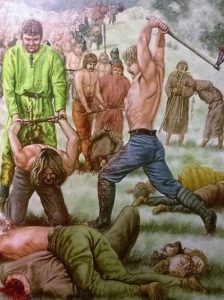 One day in the late autumn of 782, there stood 4,500 Saxons, squeezed like animals in the slaughterhouse and surrounded by their own ‘nobles’, who had handed them over, and by the paladins of the great Charles, ‘the pilot light of Europe’, as a manuscript from St Gallen of the 9th-10th centuries calls him. By his sentence, they were beheaded and thrown into the Aller, which swept them into the Weser and then into the sea. ‘There were 4,500 of them and that is what happened’ (quod ita et factum est), as the royal analyst laconically puts it, ‘and he celebrated Christmas’, just where the future ‘saint’ soon had a church built (not an expiatory chapel, but rather a triumphal chapel) and where the cathedral of Verden stands today: literally, on rivers of blood.
One day in the late autumn of 782, there stood 4,500 Saxons, squeezed like animals in the slaughterhouse and surrounded by their own ‘nobles’, who had handed them over, and by the paladins of the great Charles, ‘the pilot light of Europe’, as a manuscript from St Gallen of the 9th-10th centuries calls him. By his sentence, they were beheaded and thrown into the Aller, which swept them into the Weser and then into the sea. ‘There were 4,500 of them and that is what happened’ (quod ita et factum est), as the royal analyst laconically puts it, ‘and he celebrated Christmas’, just where the future ‘saint’ soon had a church built (not an expiatory chapel, but rather a triumphal chapel) and where the cathedral of Verden stands today: literally, on rivers of blood.
Just imagine: 4,500 people beheaded—and then the canonisation of the murderer! ‘It is true that he eliminated 4,500 Saxons’, writes Ranke, adding later, ‘but later on the serene tranquillity of a great soul stands out in him’.
______ 卐 ______
Editor’s note: Can we finally see why we should tear down the churches in Europe and behead the pope and his cardinals? Without avenging the crimes that the religion of the Semitic god perpetrated on the brave defenders of the Aryan religion, there is no mental salvation for the West. The cancer that’s killing us goes back long before the Jews took over our media, and I find it incredible that white nationalists not only refuse to see it, but continue to worship the enemy god.
